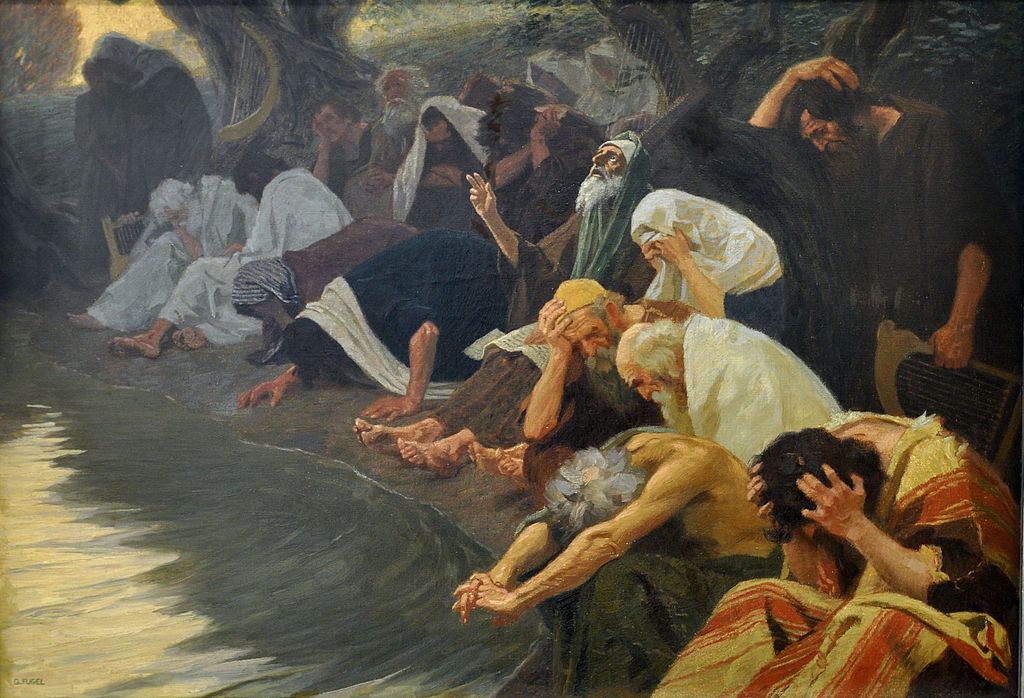August 30, 2018
Exiles” Called to Choose Life Through Death
 The modern mind cannot contemplate that the path to life may be via death.
The modern mind cannot contemplate that the path to life may be via death.
The modern Christian mind also has trouble contemplating this reality. This is despite the template of the cross of Christ, and his observation that those who seek to keep their lives will lose it, and vice versa.
Yet, as I come to preaching the conclusion of 1 and 2 Kings in a long series in our church, that was complemented by a series on 1 and 2 Samuel last year, my observation is that this idea is central to the personal life of the Christian and the life of the church in the wider culture.
Yet without this central reality governing our lives, we may well repeat the mistakes of Israel. We may well seek, in our frantic desire to succeed, be relevant, find comfort, to strive to live, rather than seek to die.
The path to life may be via death.
1 Samuel 2 makes this startling observation:
The Lord kills, and brings to life.”
Not the other way around. Not the way the secular, godless culture plays it out, and where it places its hope.
The secular frame admits that life comes, and is followed by death, so the key is to cram as much into life as one can, suck as much out of it, and if at all possible, avoid death for as long as one can, or try to control the end process.
The ironic result is that we do not have a culture that primarily celebrates life, but one that celebrates death.
This is a culture of death. We have the sad Oprah Winfrey calling out women to “shout their abortion”, when in reality many women don’t wish to do so, and are conflicted and confused.
We have those advocating assisted suicide and calling it every other name under the sun, at the same time that we have a soaring suicide rate from those intent of carrying it devoid of assistance.
The Bible reverses the directional flow of the river. Death, followed by life. It’s what needs to happen to you in order to be born of the Spirit. You have to die first, and this is enacted by you in your baptism.
By the time you get to the end of the kingship stories in 2 Kings, what we find is that Israel, remnant as she is by this time, still struggles to learn the lesson.
King Zedekiah rebels against the Babylonians. He clings to the hope of life, instead of heeding the message of the prophet Jeremiah to go into the death of exile so that Israel – and her hope in YAHWEH – may yet live.
Yet where does true life lie? Not in trying to stave off the exile, but in going through the exile to restoration. In other words, through death to life. Which is why we read these words as the very last words of 1 and 2 Kings:
In the thirty-seventh year of the exile of Jehoiachin king of Judah, in the year Awel-Marduk became king of Babylon, he released Jehoiachin king of Judah from prison. He did this on the twenty-seventh day of the twelfth month. He spoke kindly to him and gave him a seat of honor higher than those of the other kings who were with him in Babylon. So Jehoiachin put aside his prison clothes and for the rest of his life ate regularly at the king’s table. 30 Day by day the king gave Jehoiachin a regular allowance as long as he lived.
A hint of life. Life on the other side of the exile. Jehoiachin goes into the exile of death and comes out again into life. Those who rebelled against the exile? Who declared that God could not, would not, be allowing Israel to go through this deathly experience? They died. Slaughtered in the final battle with Babylon, or escaping to their old slave station of Egypt, ne’er to be heard of or seen again.
The path to life is via death.
I find all of this a sobering reminder for the church in these days of our own exile.
We, of course, are those of the remnant. Those who the true king of Israel, the Lord Jesus, rules and reigns over. But he too went to his death before resurrection burst death’s bonds.
But with Babylon in ascendency in our West, perhaps this is time to examine how much we are willing to die; die to cultural influence; die to cultural recognition; die to favours and tidbits from the king’s table; die to being at the centre and live to being a creative minority; die to the idea that if we could just get “our man/woman” in political power we could turn this ship around.
I fear that we too often listen to the false prophets in the culture who would promise the church Christendom without Christ; a parody of what we thought we had, but with the centre missing.
By all means promote and vote for public officials who honour life in all its forms and at all its stages, but do not for a moment believe that we can arm-wrestle Babylon into submission.
And that’s at the conservative end of the spectrum. On the progressive end, the effects are just as devastating, where we have a practice and ethic increasingly no different to Babylonian culture at all. There is a promise that if we sign up to the sexual ethical agenda of the culture, if we slough off the old theological insistences of the faith, that somehow we will have more sway, more influence, more, how shall we put it, “life”?
Both extremes are wrong and will, ironically, lead to death.
Our goal is to die daily on a personal level, and then as a church to constantly resist the call to find a way to sit further up the table in Babylon. You know, the seat right next to the king, where we can bend his ear a little. Time and time again this has proven to be advantageous to only one person – the king of Babylon. Yet we persist.
God calls his covenant people, as they enter the Promised Land in the book of Deuteronomy to “Choose life” (Deut 30).
That they don’t, that they constantly choose the idolatries of death that promise much but deliver little, leaves God with no option but to call them into the death of exile.
He does this so that, through that parlous and powerless state, He may raise up a King for them who, through death will bring them into the life they constantly fail to choose for themselves.
The Lord kills and brings to life. It’s bitter followed by sweet. Suffer followed by glory.
Written by
There is no guarantee that Jesus will return in our desired timeframe. Yet we have no reason to be anxious, because even if the timeframe is not guaranteed, the outcome is! We don’t have to waste energy being anxious; we can put it to better use.
Stephen McAlpine – futureproof
Stay in the know
Receive content updates, new blog articles and upcoming events all to your inbox.


